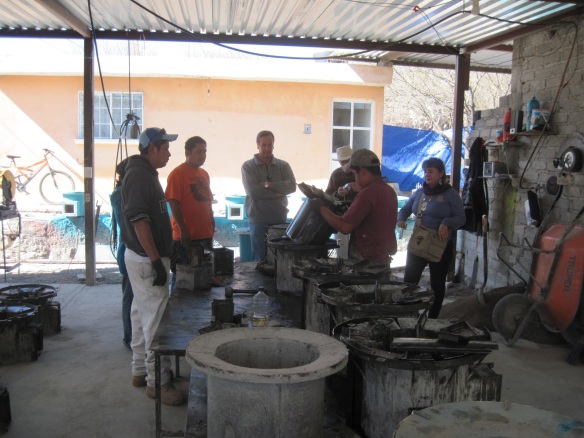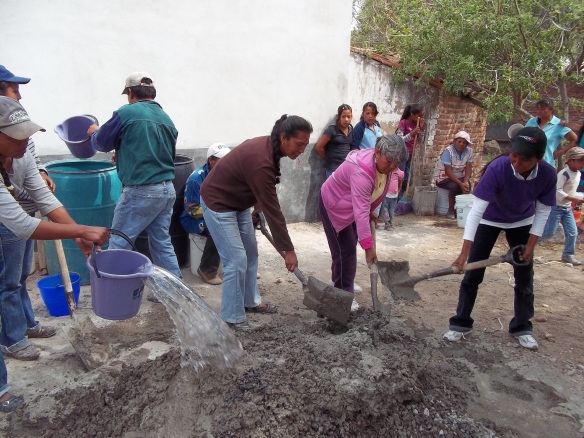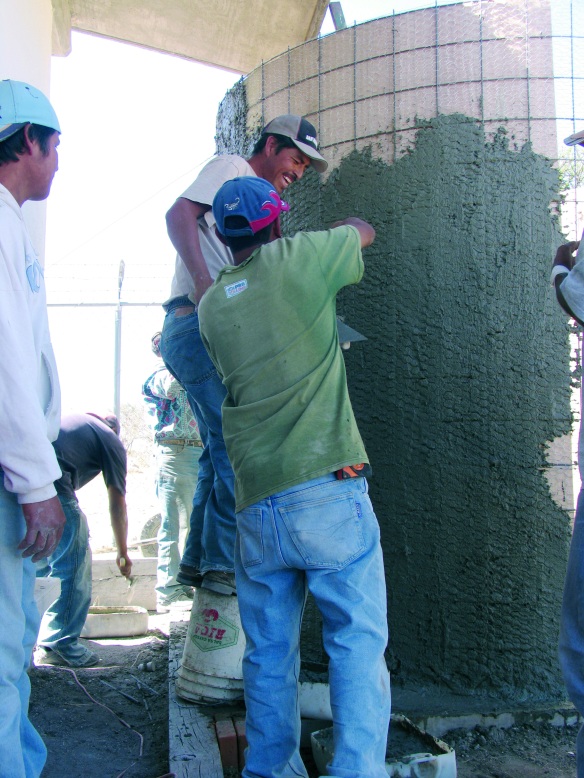During the week I was in San Miguel de Allende, Mexico it became clear that due to sheer lack, hygiene, and safety issues, two of the most basic needs—drinkable water and heat—are of tremendous concern.
With service above self as their motto, the local Rotary Club go to the people in dire need — not to gave a hand out, but a hand up — a fishing pole instead of a fish — educating people as they go.

The local Rotary Club has amazingly provided:
Water Cisterns
587 Cisterns built in 19 Communities
Benefiting 4000+ family members (+ other school & kinder children)
Cost per cistern – US $700
Ecological Stoves
Constructed 1,400 in 29 Communities
Benefiting 5,000 + family members
Cost per stove – US $48
For more information specific to the phenomenal benefits of the small economical stoves, please follow this link: StoveTeam International
To find out how your financial support can help to change lives, please contact:
John Doherty
jd98lv@hotmail.com
Rotary Club of San Miguel de Allende
Guanajuato, Mexico
Have you ever had to walk miles to reach drinkable water?
Did you know that smoke from open cooking fires kills twice as many people as malaria?
“Whatever you are not changing, you are choosing.”
— Laurie Buchanan
Discovering the Seven Selves Life Harmony Facebook
© 2012 Laurie Buchanan – All Rights Reserved





Pingback: Harvesting Water, Harnessing Heat | Simply Simplistic Complexities
This feels like such a good way of helping, Laurie. Not to give fish, but to give fishing poles. I am familiar with the Rotary Club in Michigan, but wasn’t aware that they helped people in need in places such as San Miguel de Allende. This sounds like a good place to open our pocketbooks and give. I’ve not had to walk miles for water, but am aware of the dangers of open fires.
Kathy – During my trip, I too learned that many of the U.S. Rotary Clubs are active all over the globe. I’m currently trying matchmake a connection between the Crystal Lake, IL Rotary Club and the one in San Miguel de Allende, Mexico. My hope is that they can partner on a goodwill project. Happy Thanksgiving to You and Yours 🙂
How much we take for granted! 48 bucks is the average price of a fill-up and latte at the local gas station these days! Beautiful work!
Oceannah – You put it in fantastic, relatable terms: “The price of a fill-up and latte at the local gas station.” Well said, thank you!
Hi Laurie,
We take so much for granted here. Indeed there is much to do – the hand up approach is precious! This is significant work – may all be blessed!
Hugs
SuZen
SuZen – Like you, I oh-so-appreciated learning about their hand up approach 🙂
What a great sharing of good news, and the pictures that share the story are so important too. We have a huge Rotary Group in our State and they do so many Global and local projects it sometimes takes my breath away. Our eldest daughter was a Rotary Exchange student to Denmark in High School, and worked with their projects in Africa. We hosted 8 exchange students over the years of our kids growing up. Our chapters have teamed up with Microsoft and the Gates Foundation on world wide health care especially for children – and that includes clean water issues. International Habitat for Humanity also teams up with Rotary, Architects and Designers to promote new designs for the environment and clean water.
Then it was discovered that on the I-5 corridor there is tremendous need. So our chapters are also growing huge garden farms to feed, provide work, and education to the homeless.
Thank you so much for sharing this need and support. I appreciate your good words and sharing
(Thank you also for the tweets, my sharing is not working as I am traveling around right now)
Patricia – I trust that you and yours had a lovely Thanksgiving celebration. It sounds like your oldest daughter knows first-hand the benefits of the Rotary Club. I’m just blown away by the positive impact they make all across the globe!
Deeply heart warming. This is the way to help. Very inspiring.
Don – Thank you for your visit, I appreciate it 🙂
Laurie, I see that living conditions haven’t changed an awful lot. As much foliage as I see around in your photos, I can only assume there is some rainfall. In Juarez it only raine a couple of times a year and so there were many shelters built with cardboard.and Broken-down shipping pallets. Standing cheek by jowl with what I still consider palatial homes. The sight of children running after us begging for money was something I will never, ever forget. Which is why I don’t have much sympathy for Americans who complain about the lifestyle they are living. They have riches untold compared to people in other countries, Imagine! A shower of hot water! For as long as you like! To only wash your body and nothing else! Riches!
Sandi – Your point is well taken. Many Americans simply don’t understand the daily miracles we have with running water, electricity, a roof over our heads, and food in our bellies. I wish that each of us was “required” to do public service somewhere in the global community (other than our own). I believe it would serve to scrape the scales of many people’s eyes, and in some cases, hearts…
Like Sandi, I lived for a very long time on the Texas/Mexico border. It was very easy to see the conditions that people lived in. In the winter, those in poverty who lived in huts similar to the one in the first picture above would burn old tires to keep warm. We take our clean water for granted here in America and we are so very wasteful with it. If it cost us as much as a gallon of gasoline, we would not be so wasteful. It is silly for us to be living in the desert, waiting for rainfall to give us our drinking water and the Rio Grande did not flow like it did when the area was first settled. Too many upriver dams and farms and irrigation canals. Yet, we persist, I think sometimes because we cannot think of where else to go.
Barbara – I trust that you and yours had a lovely Thanksgiving celebration. Hopefully you got to spend some time with January – I can well imagine that she’s growing like a weed! Your key words are “for granted.” I agree wholeheartedly. We take oh-so-many things for granted.
Laurie, I’ve gone on a number of camping trips back in the day, and experienced outdoor living in the sticks, where water from a spicket or a well was a long walk from our cabins or tents. It did at the time give us all a sense of appreciation, and of how some basic amenities are not to be automatically taken for granted. As far as the statistic of smoke from a cooking fire as a killer, it’s indeed a sad reality, and an urgent matter for those who may tread these grounds lightly. Sadly I am not surprised of your Mexican observations either, and applaud the amazing efforts of the Rotary club to provide relief for many.
Sam – I trust that you and yours had a wonderful Thanksgiving celebration; especially in the wake of Hurricane Sandy. I was thankful before my trip to Mexico, but I’m doubly grateful now. My sense of appreciation has clearly been stoked — I will never take basic amenities for granted again. My first change was to NOT let the water run when I brush my teeth.
I had no idea about smoke from open cooking fires killing more people than malaria. Who knew?
My sister is heavily involved with the Rotary and even went on a year-long exchange to Brazil when she was a teenager. The organization does great work and truly helps people in need.
Dana – I betcha the sister you speak of here is the same sister you mentioned once before who recommended that you read “Prescription for Nutritional Healing.” I’ve never met her, but she sounds like a keeper 🙂
It’s true! I’m pretty lucky to have a sister like her. 🙂
Teach and they will listen. Listen and they will learn. It is nice to read things about opportunities to help people, countries, we might not be aware of. It is even a greater feeling to read that someone is doing something about it!
Marlhtv – Thank you for your visit. Thank you, too, for leaving a comment. I hope you’ll come back again. I post each Tuesday…sort of Like “Tuesdays with Laurie 🙂
Love it! 🙂 Will surely read on Tuesdays.
What a great reminder of the things we take so for granted – but must give thanks for on this holiday. Thanks, Laurie.
Hi Laurie
I’ve had to carry water when on climbing and tramping trips, but all places where I have lived have had running water.
It does remind me of something that happened at a primary school I was attending at Mercer, where an old woman was invited to speak to the class, and one of the kids asked “What was the greatest thing to happen in her life”, to which she answered “running water”.
I wasn’t aware of that effect of smoke until I read it here, then I read it on a link from Ray Kurzweil’s AI site.
A whole new level of assistance is starting to come on stream, as information and skills from the best available are being captured in sophisticated computer systems, and being made available to millions as a result.
Over the next few years this process will gain momentum, and it will change everything.
We are approaching an end to the age where people have to work to ensure their survival, an end to the age of money.
We are approaching the dawn of the age of abundance, where every individual on the planet will have access to all the resource that they need to survive, and therefore have all the time they have to do whatever they choose.
Our schools and training systems will need to adapt rapidly, to teach people how to amuse themselves, when work is no longer a necessity.
Very interesting times.
Ted – I can just hear your beautiful New Zealand accent now and love the positivity ringing in your voice! I especially resonate with:
“We are approaching the dawn of the age of abundance, where every individual on the planet will have access to all the resource that they need to survive, and therefore have all the time they have to do whatever they choose.”
Pingback: The Life of Pi, Rust and Bone, The Other Son and The Man in the White Suit on Monday Morning Diary (November 25) « Wonders in the Dark
Readers – If you’ve been thinking about seeing THE LIFE OF PI, I urge you to check out Sam Juliano’s Monday Morning Diary (November 26).
“a fishing pole instead of a fish” that’s one of the most beautiful things to do; service above self.
Enlightenment and provision solves problems, I am glad that people like you and the rotary clubs engage in educating, rather than criticising and in provision rather than prejudice.
Keep up the good work!
Teeceecounsel – Ohhhhhh, I like what you’ve said here, “Provision rather than prejudice.” Well said. Very well said, indeed!
Pingback: Water | Ted Howard NZ's Blog
It is so easy to take things for granted!
Andrew – You’re so right.
I spent time in Guanajuato, Mexico as an exchange student when I was 15. Very cool experience! I would love to go back and help the people there. Glad you were able to make it. 🙂 You Rock!
Karin – An exchange student, what a fantastic experience!